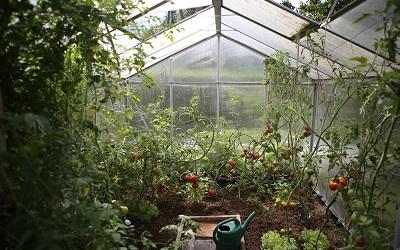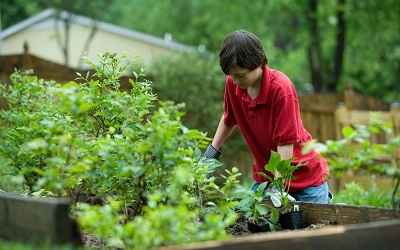Community food growing responds to the COVID-19 crisis

This blog is written by Dr Les Levidow, a Senior Research Fellow at The Open University. His research on agri-food issues has included public controversies over GM crops, as well as agroecological alternatives linked with short food-supply chains bringing producers closer to consumers.
Over the past decade or more, community food growing has become more popular and widely known for many social benefits. Participants have enhanced their own emotional well-being, self-confidence, cooperative relationships and mutual learning. They have gained skills for food-growing and spread these skills more widely.
In 2020 the COVID-19 pandemic disrupted those community initiatives, while also revealing and intensifying the stark social inequalities in our society, especially food poverty. People’s social isolation prompted greater interest to continue or join community food growing initiatives. They overcame difficult challenges, reached many more people and so extended the earlier social benefits.
To extend the benefits, it is worth exploring these questions: How does community food growing create socially inclusive, welcoming environments? How do participants make new bonds with each other across various social divides? How do they strengthen social resilience? Rather than bounce back to a previous ‘normal’, how can these capacities help build the future differently?
Special insights come from participants in a course, ‘Grassroots Visual Storytelling about Community Food-Growing’, drawn from initiatives in London and Reading. Together their short films describe efforts to overcome social isolation by sustaining or expanding food initiatives.
Storytelling has played important roles. For example, ‘During the pandemic, I told a story about a derelict former allotment and so attracted people to clear the space to create a new garden.’ As another participant said about cooperation, ‘We are powerful, but only if we can tell the stories of our power.’ Another felt that standard horticultural training takes out the fun, ‘so I want to tell a story that makes food-growing more accessible to people.’
As shown in the films, participants got to know each other better, often through their children, and extended friendship networks. For example:
- ‘My passion was taking children outside for learning because they learn better outside.’
- ‘I'm interested in what brings people together and what makes people want to do things for each other. And how children learn to be kind…’
- ‘We got a much-needed ray of sunshine to our lives through classes on Gardening for Families’.
- ‘My kids had been involved for quite a while in community garden, but I hadn't been. So this story really started there. And now we're learning a lot and growing seeds at home with the kids.‘

Cultivation activities bridged social differences of ethnicity and national origin. For example:
- ‘A group of asylum-seekers helped out in the gardens for a few months. We had the opportunity to hear their stories, welcome them and support them. This led to the idea for a Global Garden, growing food plants from other countries and cooking dishes with them.'
- ‘Previously I didn't have many friends who are observant Muslims. I think that several of people involved will become a more long-term wider and different friendship circle.’
- ‘It was extremely rewarding to be at the start of an exciting community project that potentially was a bridge between diverse communities.’
- At the heart of this garden is a community of volunteers and Gurkhas; we all share this important land. Gurkhas grow and harvest food to feed their families and communities.'
Cultivation skills were extended to homes, schools and other food growing spaces. Participants gained a sense of collective agency serving the greater good and the opportunity to 'make a difference'. For example:
- ‘The local mutual aid group started food growing in our raised beds.’
- ‘Being part of a team with a shared purpose — producing food for people in real need and having the chance to meet new friends at the same time— has been a hugely satisfying experience.’
- ‘Taking part in healthy outdoor work that benefits both the individual and the whole community helped to overcome the sense of powerlessness and to replace it with a sense of shared purpose.’
As food-growing became more popular in spring 2020, there was a shortage of vegetable seeds, so community gardens began to fill the gap and spread the skills. A staff member told this story:
- ‘I was worrying how we were going to survive. So I started sending packets of seeds to people's houses. And their reaction was unbelievable. Everybody has started to grow things at home, on the front garden on the back garden, on the neighbor's garden, etc.’
Other participants said:
- ‘We now have a raised bed for community food growing. And then a nearby school began growing food as well. It's all linked up with mutual aid. So it became a really huge.’
- ‘There's increasing recognition of the value of locally produced food and short supply chains. Therefore, the garden and everything associated with it will only continue to grow and become more important as we find our way.’
Those multiple benefits depend on staff skills, often called ‘people skills’. These facilitate cooperative, creative relationships among volunteers. As some of them said:
- ‘The organisers and tutor growers are very welcoming and encourage the belief that all the volunteers can make a worthwhile and valued contribution, regardless of previous expertise or relevant experience. For me, the most important benefit was the chance provided to interact with other people socially while being involved in a worthwhile activity, followed by the chance to learn new practical skills.’
- ‘I think the tutor did a great job, keeping us busy with new and exciting ideas..‘
- ‘[The Coordinator] has been a great motivator and teacher. You're learning so much.’
As one coordinator said: ‘My aim is to develop group capacity so that they acquire the skills to teach gardening skills and embed the values amongst the wider community.’
Those processes and benefits are depicted in several films by course participants. As they show, these group activities strengthen people’s enthusiasm, social bonds, cooperative relationships and cultivation skills for localizing food production. The project also has a podcast featuring multiple experiences and voices; see episode 8 in the series, The Pandemic and Beyond.
Through such stories, community food initiatives can identify exemplary practices, build on their strengths, spread societal benefits and attract greater commitments. Likewise, they can better advocate support measures that strengthen staff skills, replicate them more widely and gain long-term security for food-growing spaces. All this provides a basis for a different agri-food future, rather than a return to the dominant agri-food system.
Acknowledgements
This project’s partnership links: The Open University, Cobra Collective, Sustain: The alliance for better food and farming, and Reading International Solidarity Centre (RISC)
The storytelling course is part of a research project ‘Local food-growing initiatives respond to the Covid-19 crisis: enhancing well-being, building community for better futures’, funded by UK Research and Innovation (UKRI), Arts and Humanities Research Council (AHRC), The Open University grant ref: AH/V015109/1.
Request your prospectus
![]()
Explore our qualifications and courses by requesting one of our prospectuses today.